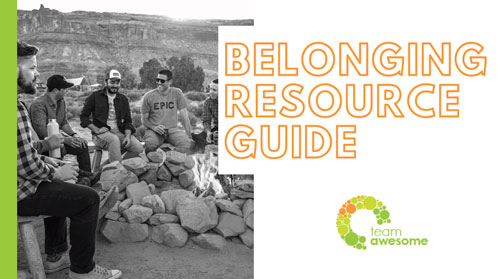I read a lot of articles and commentary regarding generations and the workplace because, well, that is my business. I have long been a proponent of changing the narrative around generations, particularly on how we describe Millennials, because what I read and hear is incongruous from what I see in the real workforce. As part of changing how we view and discuss nearly 80 million people, I have noticed a few key trends that are underrepresented in the ether.
From one Millennial to the world, here are four things to consider viewing differently if we want to foster a world full of belonging, progress, and leadership.
Stop Claiming Millennials are “Killing” Things
I am going to have to adjust my Google Alerts because I receive a daily Millennial alert that lists endless articles about Millennials killing things. Enough with the click-bait that a whole generation of young people have systematically murdered retail, restaurants, banking, wine, and real estate. You name it – we ruined it. Perhaps there are other factors we should consider, such as 30 years of doing business the same way being a reasonable lifecycle that ends in change. For every study that Millennials don’t want to buy homes, there is another one saying they do. Let’s give a little latitude here and call it what it is: human preferences changing over time due to economic and societal changes, and being driven by the speed of technology and innovation. By the time with get to Gen Z with this old argument, I am concerned we will be blaming them for actual murders. 80 million people aren’t going away so instead of focusing on who’s to blame for it, let’s look forward as to what to innovate.
Interested in reading more? Check out What Will Millennials Kill This Year?, by S.J. Velasquez via BBC.com.
Replace the Word “Millennials” with Humans
Like the old “kids these days” adage, we love to throw around the word Millennial for just about anything. What if, and hear me out, we replaced the word Millennials with the word humans? How would the headlines read? Often not reported is that at the macro level, what the Millennial generation wants is the same for humans of all ages. Gen X and Boomers benefit from finding meaning in their work, that is not just a crazy idea for the youth. While the “how” and the “why” may vary over time, the time to remove the word Millennial from quests of basic human needs and enlightenment has come. We can just say humans.
On the flip side of this, because of the overuse, there is a sort of negative connotation attached with the term “Millennials.” Try this litmus test – if you say something about the Millennial generation, and then replaced it with another group (e.g., Gen X, Baby Boomers, people of color, LGBTQ) would you still feel okay saying it? If someone said “Old people are so entitled, they want everything handed to them,” how would that make you feel? I just inserted the phrase “old people” in where I often hear “young people” or Millennials. Just writing it makes me feel like a jerk, so this is a great example of how it can be harmful to lump any group of people together, even Millennials, to make a negative claim.
Millennials Probably Don’t Read Headlines about Millennials
Because we are feeling a bit battered and bruised from reminders that were killing everything and that we are the worst generation to ever walk the planet, many Millennials don’t even associate themselves with the word. In fact, a 2015 poll showed that two-thirds of Millennials don’t actually identify with that word. As I see headline after headline discussing Millennials, I often feel like everyone is talking about me rather than to me, and they are often written without input from an actual Millennial. I love seeing more younger voices reporting viewpoints, but they are often labeled as the “Millennial” contributor, as if their input couldn’t stand on its own. We rarely label a 60-year-old male writer’s work as the “Baby Boomer” perspective, it just is what it is.
Read more about the power of connotation: Millennials: The generation that 66 percent of millennials would rather not associate with, by Hunter Schwarz, via The Washington Post.
Are Millennials Ready to be Leaders?
Sometimes we are so busy shaming Millennials that we forget that the whole generation is getting older. Older Millennials (depending on how you define the years they were born) could now be up to 37 years old. As a 35-year-old Millennial myself, I have been a home owner for over seven years, I have children, and have been in leadership roles for well over a decade. I think we are underestimating the capabilities and accomplishments of a generation by questioning if we are just now arriving at leadership competency.
This Forbes article caught my eye recently because of a visceral reaction that I had reading the title. To be fair, the author lays out averages – such as the average age of first time managers being 30 years old. But for high-performing older Millennials, this feels like old hat. Many in their thirties are leading in executive level roles, starting their own businesses, or running companies. If we just now think they are ready, that means we promoted them already without any support or training, or we have totally underestimated them and possibly failed to get them ready for their succession planning. There is value in providing emerging leaders with the resources and coaching they need, as well as the latitude and understanding that yes, they are going to do it their own way.
Read the article here: Millennials Are Ready To Be Leaders: Here’s How They’re Doing It, by Larry Alton, via Forbes.com.
I don’t mean to be the downer voice of a generation, but these gaps I see are pervasive in the conversation around Millennials. I know that we can do better, and offer open arms to a group that represents 80 million people and the largest percentage of the workforce. We have to do better, with stakes that high. Everyone’s future depends on it.
About the author:
Katie Rasoul is the Chief Awesome Officer for Team Awesome, a leadership coaching and culture consulting firm. Find out more by visiting www.teamawesomecoaching.com or join the Team Awesome Community for awesomeness coming straight to your inbox. Follow Team Awesome on Facebook and Twitter.



Recent Comments